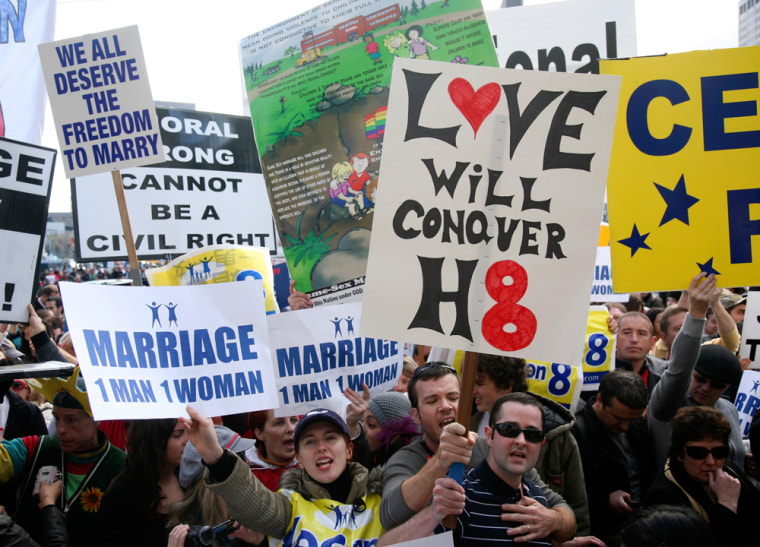The California Supreme Court will rule Tuesday on the validity of a voter-approved ban on same-sex marriage, a decision that will end months of speculation over whether gay couples can resume marrying in the state.
The high court announced the pending opinion on its Web site Friday morning.
Justices are considering a series of lawsuits seeking to overturn a constitutional amendment approved by voters in November that overruled a 4-3 court decision that briefly legalized same-sex unions. The suits claim Proposition 8 was put on the ballot improperly.
The court also will decide whether to uphold the marriages of an estimated 18,000 gay couples who wed before Proposition 8 passed. The election came after a contentious $83 million campaign that made it the most expensive ballot measure on a social issue in the nation's history.
Gay-rights advocates have scheduled marches throughout California and in several other states for Tuesday evening. Organizers say the gatherings will be celebratory if the court rules in their favor and angry if Proposition 8 is upheld.
Waiting for the decision "has been an absolutely gut-wrenching experience," said Molly McKay, spokeswoman for Marriage Equality USA.
"As Californians, we are all under tremendous strain worrying about the economy, our jobs and our families," McKay said. "On top of that, gay families have been living for months with the fear that the court will allow a bare majority of voters to strip gay and lesbian families of their constitutional protections and eliminate our marriages — or just as bad, eliminate new couples' ability to get married."
Preparing for a fight
Same-sex couples, local governments and civil-rights organizations have asked the court to throw out Proposition 8 on procedural grounds. They argued that the initiative revised the state constitution's equal protection clause to such a dramatic degree that its sponsors needed the Legislature's approval to submit it to voters.
Several justices gave that argument a skeptical reception during a March hearing, and court observers have doubted the Supreme Court would abrogate California's vigorous citizen initiative process by invalidating the ban.
Since then, three other states — Iowa, Maine and Vermont — have joined Massachusetts and Connecticut in making same-sex marriage legal, and efforts are under way to pass gay-marriage bills in New Hampshire and New York.
If the justices uphold Proposition 8, gay-rights supporters plan to return to the ballot box in an effort to repeal it next year or in 2012. The state's largest gay-rights groups already have started raising money, airing television advertisements and recruiting volunteers.
If the justices strike down Proposition 8 as an illegal revision, its backers could try asking state lawmakers to place another initiative limiting marriage to a man and a woman on next year's ballot. The prospects for such a bill are uncertain. The Democratic-controlled California Legislature has twice passed measures to legalize same-sex marriage, but they were vetoed by Gov. Arnold Schwarzenegger.
More on:
